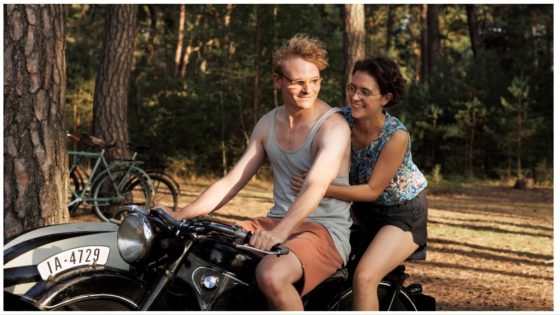When Laila Stieler’s script for “From Hilde, With Love,” which world premiered Saturday in competition at the Berlinale, first came to director Andreas Dresen he was a little reluctant to take the project on.
The issue was not the script but the subject-matter: set in Nazi-era Berlin, “From Hilde, With Love” is a love story about two real life members of the pro-Communist, German resistance movement known as the Red Orchestra, Hilde and Hans Coppi. More than 50 members of the group were guillotined in Berlin’s Plötzensee Prison between 1942 and 1943, including the Coppis. Hilde gave birth to her son in prison. He is alive today and was consulted about the production.
“I was a little bit afraid of doing these films about Nazi times, because it’s always in sepia colors, you know, very historical, very artificial always, and this is not the style of cinema I like,” he tells Variety.
“But when I read [the script], with that wonderful character [Hilde], I immediately fell in love with that woman because she’s so humble, so shy, and she would never have called herself a resistance fighter. It just would not have been possible for her. She just followed her heart, and that’s what I really liked about [the story].”
The film, which is being sold by Beta Cinema and is produced by Claudia Steffen and Christoph Friedel for Pandora Film, stars “Babylon Berlin” breakout Liv Lisa Fries and Johannes Hegemann.
One aspect of the production is the absence of the usual cliches of the Nazi period: There are no swastikas, the Gestapo officers wear suits, not black leather coats, and nobody has a dueling scar.
All of this was intentional. “I was bit afraid of these iconic statements about those times. The intention was to not give that story a kind of historical ambience. I wanted to free it from history and to bring it closer to our reality,” Dresen says.
The intention, he says, was to make everything seem almost “normal.” Before they are caught, life for Hans, Hilde and their friends seems light-hearted and almost fun: they drink, they picnic, they dance, they swim and make love.
One reason for this was that Dresen grew up in Communist East Germany where the Coppis and other members of the resistance were depicted as larger-than-life heroes. “They were so brave, everything they did was so fine, and so I found myself feeling so small in front of them, and I always thought: ‘Oh, I could never be so brave as they were and I’m such a small person,’ and I think behind that is a kind of political intention. And that was that if you don’t compare yourself to people like that, then you don’t allow yourself to step into any kind of resistance. And in East Germany, of course, it was the intention to prevent us from doing anything against the system.”
“And, so, my intention when we started production was to bring these people as close as possible to us, so we could feel that they could be our partners, they could be our friends. These are young people: they fall in love; they go swimming; they have sad times. Sometimes it looks like they are on their holidays. These are not 24/7 resistance fighters. Most of them are young people who have their own dreams. They want to have families. Hilda becomes a mother. That was important for me: to show these people as normal as possible.”
The legal process is depicted as being almost as you’d see in a democratic state. There is almost no violence shown during the interrogation, the prison guard and nurses are depicted as being as humane as they could be in the circumstances, there is little histrionics at the trial, evidence is presented calmly, a defense attorney is present, and the judge gives Hilde an opportunity to exonerate herself by accusing others, but when asked why she conspired against the state, she simply replies: “Because I loved my husband.”
“Even the Nazi part in the film, they are in a way normal people. They don’t shout, they don’t hit, except one moment. We don’t have these marching soldiers. I think the system could look friendly, but at the end it’s as dangerous as it was, even if the people are friendly, because they are opportunists. It’s not necessary to be very loud. ‘We are following the rules of the system. We do everything we can to be friendly.’ But at the end is the guillotine.”
“And, so, I wanted to show this part of history as close as possible to our reality and that we can compare ourselves to people like Hilde and Hans, on the one side, and on the other side, to the Nazis. So you can choose: On which side would I have been if I had lived there? And I think maybe even in our times, it is important to decide.”
Source Agencies



